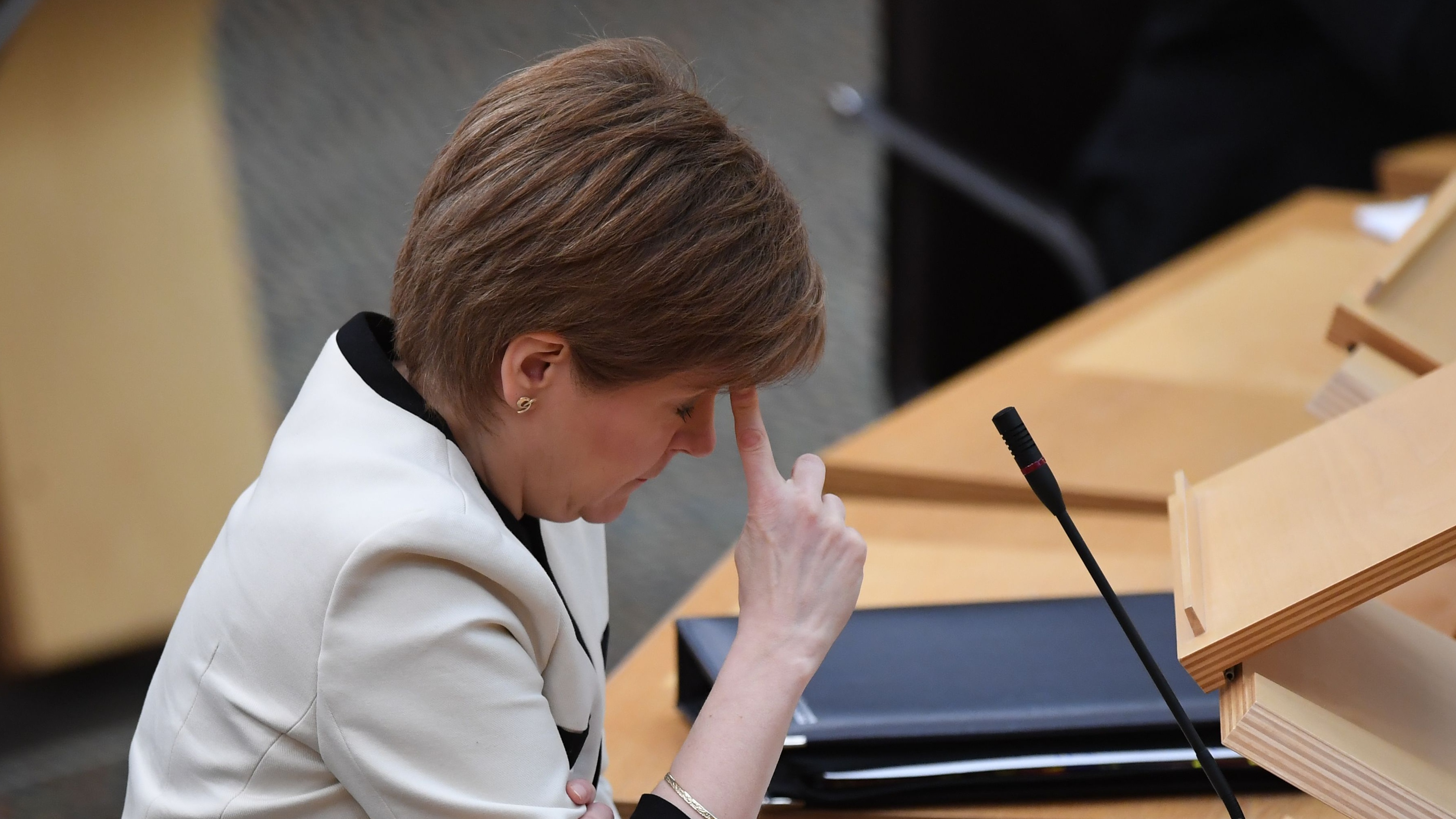Coronavirus: how Scotland split from England in its Covid-19 response
Stricter lockdown measures north of the border have not produced lower death rates

A free daily email with the biggest news stories of the day – and the best features from TheWeek.com
You are now subscribed
Your newsletter sign-up was successful
Scotland is moving to tighten up its coronavirus restrictions after passing 7,000 deaths from confirmed or suspected Covid-19 since the pandemic began.
The ramped-up restrictions will see click-and-collect services limited to essential shopping, new rules on collecting takeaways from inside restaurants and will see Scots only allowed to leave home for essential purposes.
First Minister Nicola Sturgeon chose to increase restrictions following a meeting with her cabinet this morning, taking the opposite approach to Boris Johnson who is focusing on compliance with existing Covid restrictions after gathering his cabinet on Sunday.
The Week
Escape your echo chamber. Get the facts behind the news, plus analysis from multiple perspectives.

Sign up for The Week's Free Newsletters
From our morning news briefing to a weekly Good News Newsletter, get the best of The Week delivered directly to your inbox.
From our morning news briefing to a weekly Good News Newsletter, get the best of The Week delivered directly to your inbox.
Deaths north of the border
Scotland is currently battling an increase in deaths, with official data showing that 384 deaths were registered which mentioned Covid-19 on the death certificate between 4 and 10 January, up 197 on the previous week.
The country went into lockdown on 5 January with people only allowed to leave their homes for essential purposes and all schools moved to remote learning for the whole of January.
Addressing the Scottish parliament, Sturgeon today said that Scots should not “think in terms of the maximum interactions you can have without breaking the rules”.
A free daily email with the biggest news stories of the day – and the best features from TheWeek.com
The warning echoes Health Secretary Matt Hancock’s comments on Sky News’ Sophy Ridge on Sunday last weekend in which he said England’s rules were “not there as boundaries to be pushed”, and come after a bumpy series of months in Scotland’s pandemic response.
In November, the Financial Times (FT) reported that “weeks of official statistics suggest that proportionately more people have actually been dying of coronavirus in Scotland than in England”.
While Hancock and Sturgeon are this week singing from the same hymn sheet, Scotland has diverged from England in its approach to containing the pandemic. And the death rate in Scotland “challenges a popular image of Sturgeon and her government as being more effective in the fight against coronavirus”, the paper adds.
Disunited kingdom
The UK’s response to the pandemic has given the Scottish National Party (SNP) a new argument for independence, according to some of its most prominent MPs, including Joanna Cherry, a front runner to succeed Sturgeon as SNP leader.
In May, she told The Times that the “incompetent handling of Brexit and the Covid crisis by Westminster builds the case for independence”, adding that “many more people” would now question the UK as a “stable and competent entity” after the pandemic.
As the BBC has noted, many of Sturgeon’s decisions have “matched those by the UK government for England and the devolved administrations for Wales and Northern Ireland”. However, advisor to the Scottish government Professor Devi Sridhar told The Telegraph in October that unlike England, Scotland was pursuing a “zero Covid” strategy like the one implemented in New Zealand.
After lockdown restrictions were eased last summer, Scotland consistently maintained tougher lockdown restrictions than England, according to Oxford University researchers tracking the government responses to coronavirus. Scotland’s lockdown stringency score - a measure derived by the researchers from the entirety of a country’s restrictions - was higher than England’s throughout May to October.
Death rates began slowing in November, according to monthly data published by the National Records of Scotland. But that month, after weeks of stronger restrictions than those seen in England, deaths “recently outpaced” those seen south of the border.
Perception split
A marked difference between the two nations can be found in public perception of the pandemic handling.
An Ipsos Mori poll of voters in Scotland published in November, when Scots were dying at a higher rate than England, found that 72% thought the Scottish government was handling the coronavirus well. This compared with just 25% who said the same of the UK government.
Meanwhile, across the entire UK, just 31% of voters believe that the government is currently handling coronavirus “well” or “somewhat well”, according to polling by YouGov.
Joe Evans is the world news editor at TheWeek.co.uk. He joined the team in 2019 and held roles including deputy news editor and acting news editor before moving into his current position in early 2021. He is a regular panellist on The Week Unwrapped podcast, discussing politics and foreign affairs.
Before joining The Week, he worked as a freelance journalist covering the UK and Ireland for German newspapers and magazines. A series of features on Brexit and the Irish border got him nominated for the Hostwriter Prize in 2019. Prior to settling down in London, he lived and worked in Cambodia, where he ran communications for a non-governmental organisation and worked as a journalist covering Southeast Asia. He has a master’s degree in journalism from City, University of London, and before that studied English Literature at the University of Manchester.
-
 Why is the Trump administration talking about ‘Western civilization’?
Why is the Trump administration talking about ‘Western civilization’?Talking Points Rubio says Europe, US bonded by religion and ancestry
-
 Quentin Deranque: a student’s death energizes the French far right
Quentin Deranque: a student’s death energizes the French far rightIN THE SPOTLIGHT Reactions to the violent killing of an ultraconservative activist offer a glimpse at the culture wars roiling France ahead of next year’s elections
-
 Secured vs. unsecured loans: how do they differ and which is better?
Secured vs. unsecured loans: how do they differ and which is better?the explainer They are distinguished by the level of risk and the inclusion of collateral
-
 A Nipah virus outbreak in India has brought back Covid-era surveillance
A Nipah virus outbreak in India has brought back Covid-era surveillanceUnder the radar The disease can spread through animals and humans
-
 Covid-19 mRNA vaccines could help fight cancer
Covid-19 mRNA vaccines could help fight cancerUnder the radar They boost the immune system
-
 The new Stratus Covid strain – and why it’s on the rise
The new Stratus Covid strain – and why it’s on the riseThe Explainer ‘No evidence’ new variant is more dangerous or that vaccines won’t work against it, say UK health experts
-
 RFK Jr. vaccine panel advises restricting MMRV shot
RFK Jr. vaccine panel advises restricting MMRV shotSpeed Read The committee voted to restrict access to a childhood vaccine against chickenpox
-
 The UK’s opioid crisis: why the stats don’t add up
The UK’s opioid crisis: why the stats don’t add upThe Explainer A new report has revealed that the UK’s total of opioid-related deaths could be much greater than official figures show
-
 RFK Jr. scraps Covid shots for pregnant women, kids
RFK Jr. scraps Covid shots for pregnant women, kidsSpeed Read The Health Secretary announced a policy change without informing CDC officials
-
 New FDA chiefs limit Covid-19 shots to elderly, sick
New FDA chiefs limit Covid-19 shots to elderly, sickspeed read The FDA set stricter approval standards for booster shots
-
 RFK Jr.: A new plan for sabotaging vaccines
RFK Jr.: A new plan for sabotaging vaccinesFeature The Health Secretary announced changes to vaccine testing and asks Americans to 'do your own research'